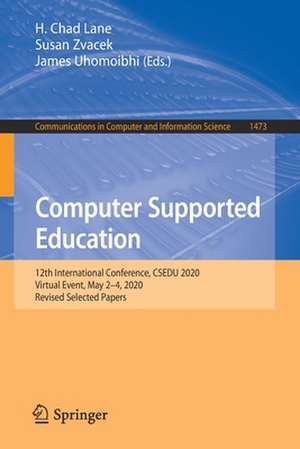Computer Supported Education: 12th International Conference, CSEDU 2020, Virtual Event, May 2–4, 2020, Revised Selected Papers: Communications in Computer and Information Science, cartea 1473
Editat de H. Chad Lane, Susan Zvacek, James Uhomoibhien Limba Engleză Paperback – 9 oct 2021
The 25 revised full papers were carefully reviewed and selected from 190 submissions. The presented papers contribute to the understanding of relevant trends of current research on Computer Supported Education, including learning analytics, intelligent tutoring systems, virtual and augmented reality, MOOCs, and automated assessment systems.
| Toate formatele și edițiile | Preț | Express |
|---|---|---|
| Paperback (2) | 594.73 lei 6-8 săpt. | |
| Springer International Publishing – 9 oct 2021 | 594.73 lei 6-8 săpt. | |
| Springer International Publishing – 10 noi 2020 | 658.55 lei 6-8 săpt. |
Din seria Communications in Computer and Information Science
- 20%
 Preț: 325.48 lei
Preț: 325.48 lei - 20%
 Preț: 669.06 lei
Preț: 669.06 lei - 20%
 Preț: 324.64 lei
Preț: 324.64 lei - 20%
 Preț: 337.85 lei
Preț: 337.85 lei - 20%
 Preț: 656.19 lei
Preț: 656.19 lei - 20%
 Preț: 659.97 lei
Preț: 659.97 lei - 20%
 Preț: 333.88 lei
Preț: 333.88 lei - 20%
 Preț: 337.52 lei
Preț: 337.52 lei - 20%
 Preț: 656.36 lei
Preț: 656.36 lei - 20%
 Preț: 656.69 lei
Preț: 656.69 lei - 20%
 Preț: 659.31 lei
Preț: 659.31 lei -
 Preț: 392.60 lei
Preț: 392.60 lei - 20%
 Preț: 329.58 lei
Preț: 329.58 lei -
 Preț: 386.00 lei
Preț: 386.00 lei - 20%
 Preț: 336.02 lei
Preț: 336.02 lei - 20%
 Preț: 334.53 lei
Preț: 334.53 lei - 20%
 Preț: 331.74 lei
Preț: 331.74 lei - 20%
 Preț: 655.85 lei
Preț: 655.85 lei - 20%
 Preț: 338.49 lei
Preț: 338.49 lei - 20%
 Preț: 333.88 lei
Preț: 333.88 lei - 20%
 Preț: 334.53 lei
Preț: 334.53 lei - 20%
 Preț: 338.68 lei
Preț: 338.68 lei - 20%
 Preț: 666.58 lei
Preț: 666.58 lei - 20%
 Preț: 307.20 lei
Preț: 307.20 lei - 20%
 Preț: 336.02 lei
Preț: 336.02 lei - 20%
 Preț: 338.68 lei
Preț: 338.68 lei - 20%
 Preț: 330.24 lei
Preț: 330.24 lei - 20%
 Preț: 660.81 lei
Preț: 660.81 lei - 15%
 Preț: 648.42 lei
Preț: 648.42 lei - 20%
 Preț: 653.56 lei
Preț: 653.56 lei - 20%
 Preț: 332.06 lei
Preț: 332.06 lei - 20%
 Preț: 337.85 lei
Preț: 337.85 lei - 20%
 Preț: 1055.29 lei
Preț: 1055.29 lei - 20%
 Preț: 836.50 lei
Preț: 836.50 lei - 20%
 Preț: 656.69 lei
Preț: 656.69 lei - 20%
 Preț: 1231.01 lei
Preț: 1231.01 lei - 20%
 Preț: 331.25 lei
Preț: 331.25 lei - 20%
 Preț: 336.02 lei
Preț: 336.02 lei - 20%
 Preț: 323.00 lei
Preț: 323.00 lei - 20%
 Preț: 113.94 lei
Preț: 113.94 lei - 20%
 Preț: 336.21 lei
Preț: 336.21 lei -
 Preț: 387.75 lei
Preț: 387.75 lei - 20%
 Preț: 470.58 lei
Preț: 470.58 lei - 20%
 Preț: 750.86 lei
Preț: 750.86 lei - 20%
 Preț: 337.00 lei
Preț: 337.00 lei - 20%
 Preț: 327.95 lei
Preț: 327.95 lei - 20%
 Preț: 410.03 lei
Preț: 410.03 lei - 20%
 Preț: 335.36 lei
Preț: 335.36 lei - 20%
 Preț: 534.59 lei
Preț: 534.59 lei - 20%
 Preț: 673.02 lei
Preț: 673.02 lei
Preț: 594.73 lei
Preț vechi: 699.69 lei
-15% Nou
Puncte Express: 892
Preț estimativ în valută:
113.80€ • 118.82$ • 94.18£
113.80€ • 118.82$ • 94.18£
Carte tipărită la comandă
Livrare economică 04-18 aprilie
Preluare comenzi: 021 569.72.76
Specificații
ISBN-13: 9783030864385
ISBN-10: 3030864383
Pagini: 498
Ilustrații: XV, 498 p. 151 illus., 122 illus. in color.
Dimensiuni: 155 x 235 mm
Greutate: 0.72 kg
Ediția:1st ed. 2021
Editura: Springer International Publishing
Colecția Springer
Seria Communications in Computer and Information Science
Locul publicării:Cham, Switzerland
ISBN-10: 3030864383
Pagini: 498
Ilustrații: XV, 498 p. 151 illus., 122 illus. in color.
Dimensiuni: 155 x 235 mm
Greutate: 0.72 kg
Ediția:1st ed. 2021
Editura: Springer International Publishing
Colecția Springer
Seria Communications in Computer and Information Science
Locul publicării:Cham, Switzerland
Cuprins
Strategies for the Utilization of Virtual Reality Technologies in the First Year of Architectural Education.- MOOCs, Learning Analytics and OER: An Impactful Trio for the Future of Education!.- Human Factors 4.0 for Engineering and Design Education.- The Effect of Online Discussions on Student's Cognitive and Metacognitive Development.- Practising Reading Fluency with Virtual Voice Assistants: Theoretical Perspectives and Experiences.- Participation in Asynchronous Online Forums for Prediction of Learning Performance.- The Code.org Platform in the Developing of Computational Thinking with Elementary School Students.- Improving Learner Experience, Motivation and Knowledge Gain When using Mulsemedia-based Technology Enhanced Learning.- Effects of Adaptive Educational Games on Adults' Computational Thinking.- Using Augmented Reality in an Inquiry-based Physics Laboratory Course.- Creative Learning inProblem Solving and Development of Computational Thinking.- Through the Lens of Different Stakeholders: Development and Application of a Change Management Guideline for Flipped Classroom
Implementations.- Successful Virtual Collaborative Learning: A Shift in Perspective.- TAEP4.0: Pathways to Education 4.0.- Lukewarm Starts for Computerized Adaptive Testing based on Clustering and IRT.- Technology Enhanced Assessment: Objective Structured Clinical Examination Supported by Simuportfolio.- Working on Interdisciplinary Projects to Strengthen Creative Computational Thinking and to Support Talent Development.- Automatic Formative Assessment Strategies for the Adaptive Teaching of Mathematics.- Improvements in bASES21 - 21st Century Skills Assessment Model to K12.- Modeling Learners in MOOC: A Systematic Review.- The Effect of Prior Knowledge on Persistence, Participation and Success in a Mathematical MOOC.- Systematic Literature Review of Fairness in Learning Analytics and Application of Insights in a Case Study.- Gaze-based Prediction of Students' Understanding of Physics Line-graphs: An Eye-tracking-data based Machine-learning Approach.- Recognition of Students' Multiple Mental States in Conversation based on Multimodal Cues.- Automatic Evaluation of Students' Learning Experience based on Their Freely-written Comments.
